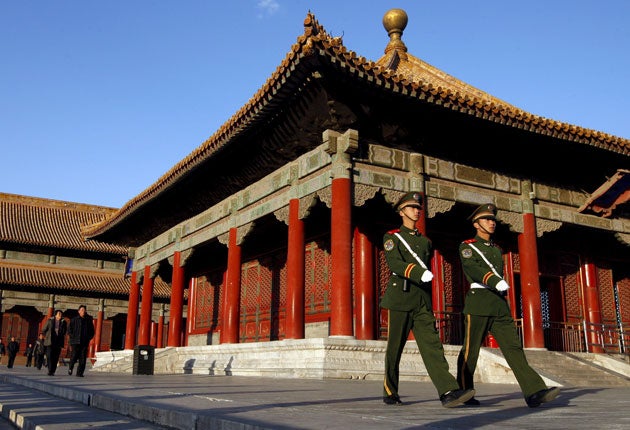Forbidden City denies it houses club for China's new super-rich

Your support helps us to tell the story
From reproductive rights to climate change to Big Tech, The Independent is on the ground when the story is developing. Whether it's investigating the financials of Elon Musk's pro-Trump PAC or producing our latest documentary, 'The A Word', which shines a light on the American women fighting for reproductive rights, we know how important it is to parse out the facts from the messaging.
At such a critical moment in US history, we need reporters on the ground. Your donation allows us to keep sending journalists to speak to both sides of the story.
The Independent is trusted by Americans across the entire political spectrum. And unlike many other quality news outlets, we choose not to lock Americans out of our reporting and analysis with paywalls. We believe quality journalism should be available to everyone, paid for by those who can afford it.
Your support makes all the difference.In the lovingly restored Jianfu Palace hall in Beijing's Forbidden City, where emperors once strolled and admired spectacular works of classical art, a group of 500 of China's new rich can enjoy special privileges at a super-exclusive private club, according to Chinese media reports.
Membership costs one million yuan, or nearly £93,000, and news of the club has caused a huge outcry in Communist China, particularly after purported details of the contract to join were posted on the internet. The idea of a private club where China's superwealthy can entertain families and friends has been denied by officials.
The Jianfu Palace was refurbished six years ago after a Hong Kong businessman, Ronnie Chan, donated nearly £9m. It burned down in 1923, reportedly after a robbery.
News of the club's existence was broken by the state broadcaster CCTV, which pointed out that the palace was a national treasure that belonged to all of the Chinese people.
The palace is part of the Forbidden City's second largest garden, the West Garden, built in 1740. The Qing dynasty Emperor Qianlong liked to stroll in the garden, and many of the treasures he collected were stored in the palace.
The collective membership fee for the 500 came to five times the cost of rebuilding the palace, CCTV presenter Rui Chenggang observed. "Chan could never have imagined the museum would one day repay his good will in this way," he wrote on his blog. "The Forbidden City belongs to every Chinese. A foreign tour guide proudly told me that he just arranged a family dinner party for an American billionaire."
The Palace Museum, which curates the art collection relating to the Forbidden City, has denied the existence of any club. "Jianfu Palace is mainly used for hosting distinguished guests and organising high-level events such as a salon for cultural exchange. The alleged lucrative club is pure nonsense," it said in a statement. "We will not allow a private club management model to run the Jianfu Palace."
Following the denial, Beijing News printed further claims about the club. It cited a source saying he had attended an opening ceremony organised by a subsidiary of the Palace Museum.
The luxury club scandal comes at a bad time for the museum. Earlier this month, a tourist-turned-burglar stole seven valuable curios from the Forbidden City that had been on loan from a Hong Kong collection.
The huge Forbidden City, which faces Tiananmen Square, has its own security force with more than 100 patrol dogs, 1,600 anti-theft alarms, 3,700 smoke detectors and at least 3,700 surveillance cameras, according to the Xinhua news agency.
The theft was the first from the Forbidden City in a quarter of a century. Thefts from the imperial palace are a particularly sensitive issue, because when Taiwan split from the mainland after the 1949 civil war, the vast majority of the collection of rare tapestries, sculptures and objets d'art ended up in the Palace Museum in Taipei, where they remain.
Public reaction to news of the club was scathing. "We have a daily struggle to pay for our house and our daily expenses, with no amusement at all," said one Beijing resident, surnamed Li. "They live like emperors and noblemen, with beautiful food and beautiful girls around, doing nothing.
"We just have to accept this difference if we want a peaceful life – abnormal behaviour by the rich classes – otherwise we feel too much pain thinking about what we can't afford."
Join our commenting forum
Join thought-provoking conversations, follow other Independent readers and see their replies
Comments